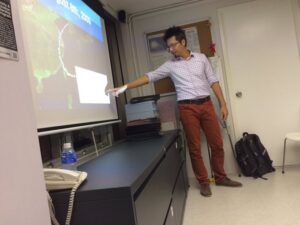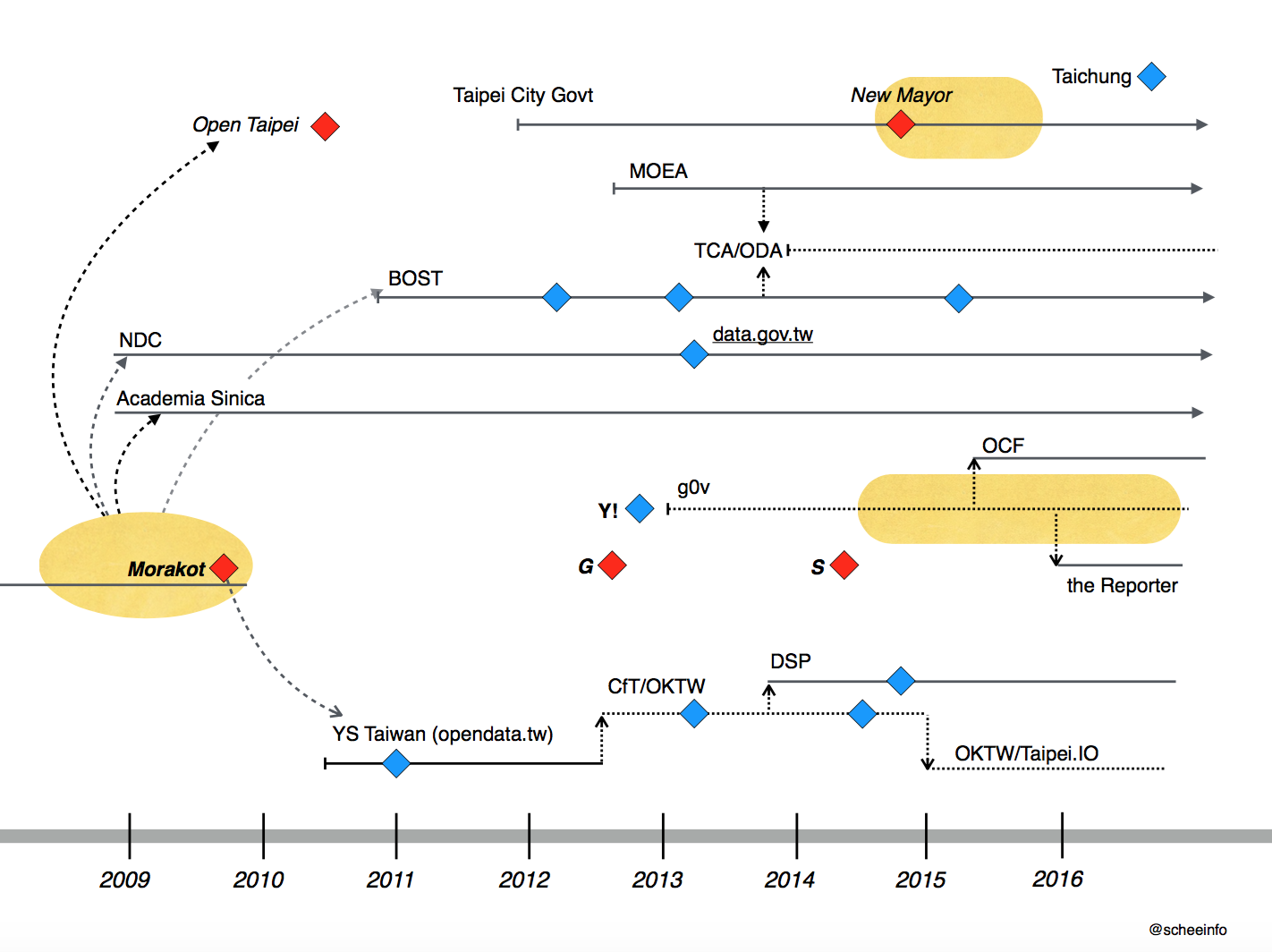Dumb Versus Smart Cities
 It seemed appropriate in the same week that Hong Kong was hosting a smart city summit to host a meetup getting valuable insight into how a true smart city – Taipei – works. Taipei Mayoral Advisor TH Schee was in town and gave us a “fireside chat” insight into the secrets of Taiwan’s success here, and inspire us with ideas on how to set up an open data policy for Hong Kong. Despite styling itself as Asia’s World City, and “smart city” being the buzzword in Government circles that everybody is targeting to get funding for, Hong Kong has a long way to prove itself in this area. A smart city is an urban development vision to integrate multiple data sources to manage a city’s asset . Without open data to drive them, smart cities are doomed to failure, and Hong Kong’s poor digital policies means it will continue to be overtaken by its neighbours in innovation and technology. This means it is particularly timely and topical to ask policy lessons we can learn from our most successful neighbour in this field, Taiwan.
It seemed appropriate in the same week that Hong Kong was hosting a smart city summit to host a meetup getting valuable insight into how a true smart city – Taipei – works. Taipei Mayoral Advisor TH Schee was in town and gave us a “fireside chat” insight into the secrets of Taiwan’s success here, and inspire us with ideas on how to set up an open data policy for Hong Kong. Despite styling itself as Asia’s World City, and “smart city” being the buzzword in Government circles that everybody is targeting to get funding for, Hong Kong has a long way to prove itself in this area. A smart city is an urban development vision to integrate multiple data sources to manage a city’s asset . Without open data to drive them, smart cities are doomed to failure, and Hong Kong’s poor digital policies means it will continue to be overtaken by its neighbours in innovation and technology. This means it is particularly timely and topical to ask policy lessons we can learn from our most successful neighbour in this field, Taiwan.
Hong Kong has dropped out of the top 10 of the WIPO global innovation index in recent years, and is currently ranked 37th in the Open Knowledge Open Data Index. And due to a misreading of the HK Government data licensing policy (which are not open or interoperable by any definition) without this overly generous scoring would mean we would likely rank 20-30 places lower. Contrast this with Taiwan, which in the last Index overtook the UK to be the highest ranked place in the world for Open Data. From the outside it seems a data-driven utopia, with a new “Minister for Data” moving from g0v.tw citizen-run open data groups such as ours to now being in the heart of Government.
TH Schee has been at the front line of this Taiwanese Open Data revolution, and has written interesting blogs on the topic, but it was great having him come and talk us through the backstory and potential policy lessons in person. With extra juice stories of the unsung heroes behind the scenes to be told. Meet.33 was our first gathering in a while, and it was great to see such a huge turnout. Thanks to Justice Centre Hong Kong for giving us the space in Sai Ying Pun at such short notice, and to Adam Severson for giving us an intro on the great work they do single handedly supporting refugee legal services in Hong Kong. Adam also give us a quick intro on the difficulties they as a NGO face decision making in an information vacuum where the government politicizes immigration and crime data but refuses to share any of it.
Open Data versus Natural Disasters
Getting a government sceptical of transparency to share data is a challenge, but one that Taiwan seems to have managed admirably. The process of trust building and collaboration between civic hackers and government in Taiwan had an unlikely ally: mother nature. Or more specifically, natural disasters such as the many earthquakes and typhoons that pound Taiwan with unfortunate regularity. The disastrous typhoon Morakot in 2009 was the turning point in how Taiwan dealt with data. Official government communication early in the crisis failed, causing people to turn to websites run NGOs and the civic hacker community. Web users began reporting the real-time situation on the bulletin board forum PTT and on early social media platforms like plunk. At the height of the crisis an unofficial Morakot Online Disaster Report Center was established by a group of internet users from the Association of Digital Culture. The government quickly realized that this information was saving lives, and this website was then integrated into local governments’ communication systems and updated from the official disaster response center. From the trust and experience gathered in the front line of “internet rescue management” the people involved help seed the initial environment that has allowed this open data driven society to bloom (see this published case study for more). TH presented a very detailed timeline of this covering the founding of communities such as g0v.tw and opendata.tw, data journalism and open data social enterprises spin offs, and how many the people involved in these citizen organization then made their way into the heart of government. Initially from the Mayors of Taipei and Taichung running on open data policy driven platforms, culminating in Audrey Tang becoming minister without portfolio in the new national government.
 How we can take policy lessons from this in soft , natural-disaster-free Hong Kong is another matter, but it shows we need to be prepared, and we need to build similar networks of organisations leading by example. One advantage Taiwan has had is a strong open source and open access community in academia (particularly Academia Sinica) that has always been a safe haven and place of continuous support for these efforts. We don’t yet have an equivalent in Hong Kong, but some members of ODHK have just put together an overview and survey on research data policy (see the pre-print), a nascent Asian open access network is forming, and this years Open Access Week looks to be the biggest in Hong Kong so far, with 3 events organised already. We recorded TH’s talk on periscope so you can see the archive there, as well as inspect his incredibly detailed slides. A one hour discussion really wasn’t enough, and we hope we can tempt TH back another time to give us more insight. We have more regular meetups in the pipeline, and our next one is on the Wednesday 12th October on open data tools at Campfire in Kennedy Town. We hope to see many of you there, and continue to build these communities that will hopefully let Hong Kong follow a similar trajectory to Taiwan.
How we can take policy lessons from this in soft , natural-disaster-free Hong Kong is another matter, but it shows we need to be prepared, and we need to build similar networks of organisations leading by example. One advantage Taiwan has had is a strong open source and open access community in academia (particularly Academia Sinica) that has always been a safe haven and place of continuous support for these efforts. We don’t yet have an equivalent in Hong Kong, but some members of ODHK have just put together an overview and survey on research data policy (see the pre-print), a nascent Asian open access network is forming, and this years Open Access Week looks to be the biggest in Hong Kong so far, with 3 events organised already. We recorded TH’s talk on periscope so you can see the archive there, as well as inspect his incredibly detailed slides. A one hour discussion really wasn’t enough, and we hope we can tempt TH back another time to give us more insight. We have more regular meetups in the pipeline, and our next one is on the Wednesday 12th October on open data tools at Campfire in Kennedy Town. We hope to see many of you there, and continue to build these communities that will hopefully let Hong Kong follow a similar trajectory to Taiwan.
Save
Save
Save

